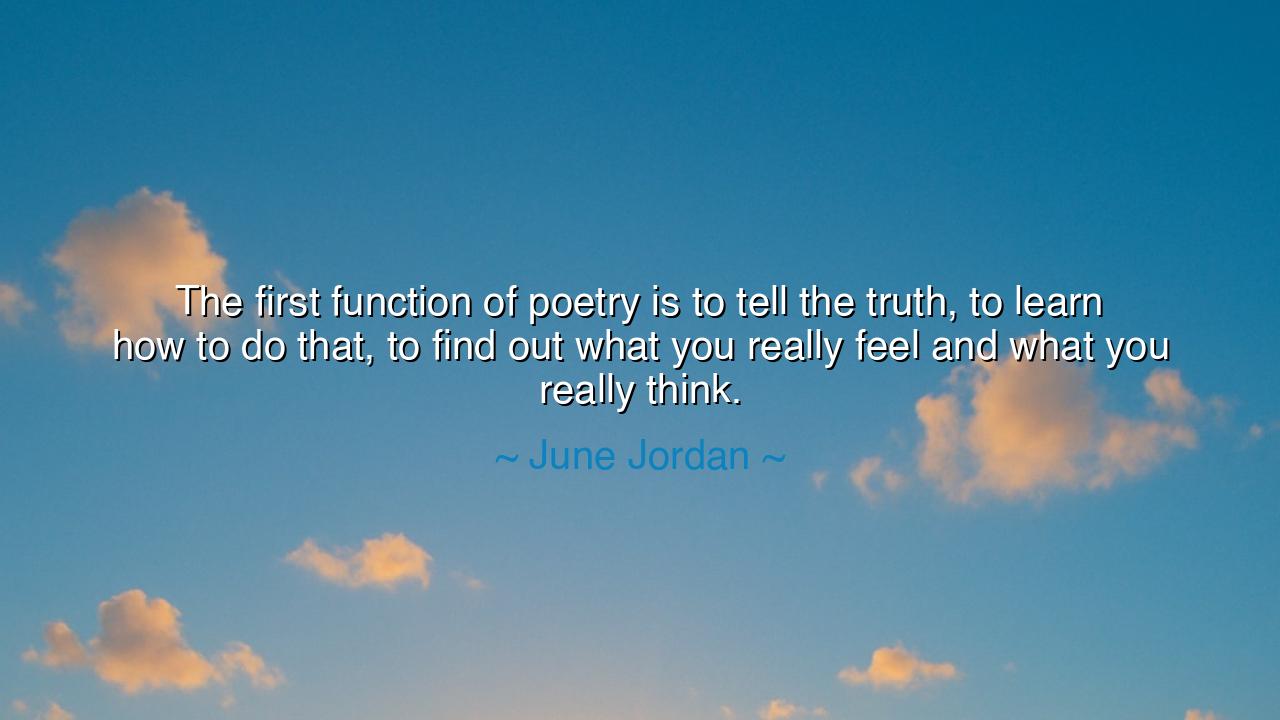
The first function of poetry is to tell the truth, to learn how
The first function of poetry is to tell the truth, to learn how to do that, to find out what you really feel and what you really think.






Hear the unflinching words of June Jordan, poet of justice and voice of the oppressed, who declared: “The first function of poetry is to tell the truth, to learn how to do that, to find out what you really feel and what you really think.” This teaching is not clothed in ornament or abstraction. It is direct, like the stroke of a blade, like the clear light of morning breaking upon shadows. Jordan reminds us that poetry, before it is song or beauty or craft, is an act of truth-telling—the sacred work of uncovering what lies buried in the heart and mind.
The meaning is profound. Many think of poetry as a place for decoration, for riddles, for clever words arranged like jewels. But Jordan cuts through this illusion. She teaches that the poet’s task is first to confront themselves, to name what they feel honestly, without disguise. For how can a poet move others if they have not first been honest with themselves? To tell the truth in poetry is not easy. It requires stripping away masks, silencing the voices of convention, and daring to write what one truly thinks, even if it is uncomfortable, even if it is dangerous.
History bears witness to the power of such truth-telling. Consider the slave narratives of the nineteenth century, where men and women who had lived in bondage wrote poems and testimonies that revealed the brutal reality of slavery. Their words were not polished to please; they were fierce, raw, and unyielding. By telling the truth, they shook the conscience of a nation and ignited movements for freedom. Or think of Anna Akhmatova in Soviet Russia, whose poetry whispered the forbidden pain of her people. In times when lies were enforced, her truth in verse was an act of rebellion, an anchor for souls drowning in silence.
June Jordan herself embodied this truth. As a Black woman, as a fighter for civil rights, as a poet who refused to be silent, she wrote with fearless honesty. She wrote of race, gender, violence, and love with equal courage, always returning to the conviction that poetry must reveal what is real. To her, the measure of a poem was not how clever it sounded, but whether it brought the reader closer to the truth—the truth of injustice, the truth of longing, the truth of what it means to be human.
This teaching carries a heroic weight. For truth is not soft; it is often hard, jagged, and heavy. To tell the truth is to risk rejection, to expose one’s wounds, to challenge powers that profit from lies. Yet Jordan declares that the poet must take this risk, for in truth there is liberation. To write falsely may win approval, but it leaves the soul empty. To write truthfully may cost dearly, but it brings strength, clarity, and freedom.
The lesson for us is clear: in your own writing, in your own living, begin with truth. Do not ask first, Is this beautiful? Ask instead, Is this true? Find what you really feel, not what you are expected to feel. Name what you truly think, not what you are told to think. Only then can your words carry the weight of authenticity, only then can they touch others deeply, for people recognize truth when they hear it, even if it is painful.
Practical steps follow. Keep a journal where you write without censoring yourself, allowing the raw truth to appear. When you compose poems or speeches, read them aloud and ask: Does this reflect what I truly believe, or what I think others want to hear? Read poets who dared to tell the truth—Langston Hughes, Adrienne Rich, Mahmoud Darwish—and let their courage inspire you. And above all, in your daily life, cultivate honesty of heart, for only an honest heart can give birth to honest poetry.
Thus June Jordan’s words endure as both command and compass: “The first function of poetry is to tell the truth, to find out what you really feel and what you really think.” Let us carry them like fire, remembering that all art begins with honesty, and that to speak the truth in poetry is to give light to the world, a light no darkness can overcome.






AAdministratorAdministrator
Welcome, honored guests. Please leave a comment, we will respond soon